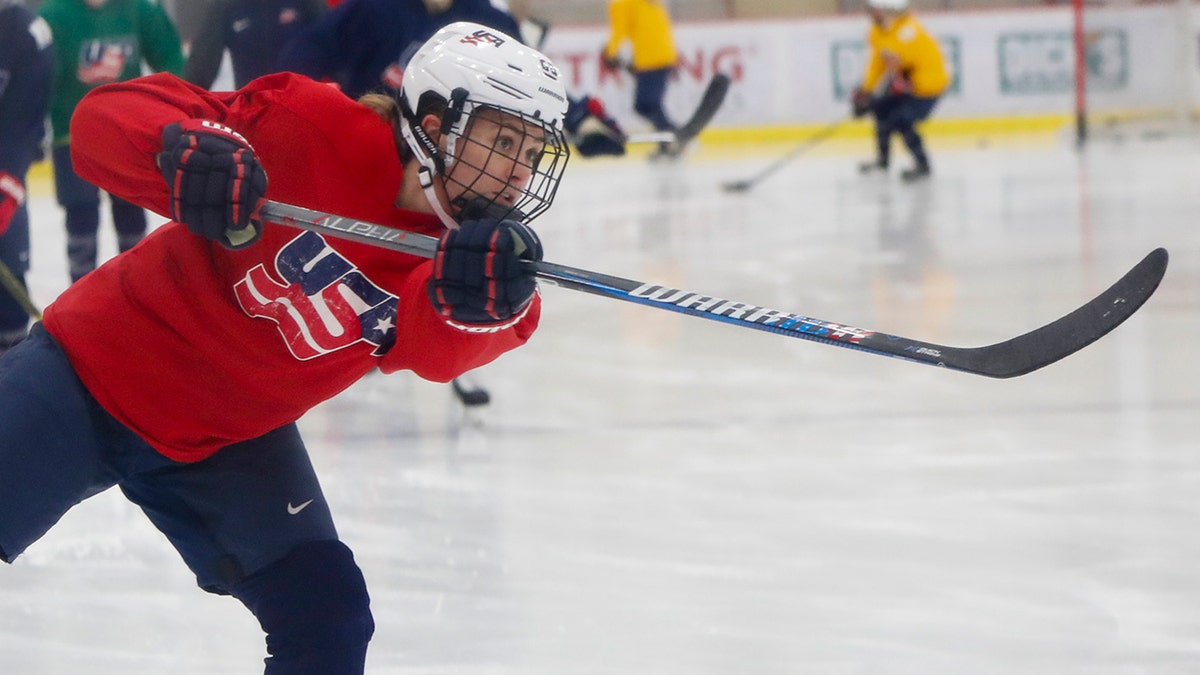
In this Monday, Nov. 4, 2019, photo, Alexandra Carpenter goes through drills while playing with the U.S. Women's National hockey team in Cranberry Township, Butler County, Pa., ahead of scheduled exhibition games against Canada. Carpenter, college hockey's top player in 2015 and daughter of former NHL star Bobby Carpenter, is also leading Russia's Women's Hockey League in scoring while playing for the Chinese-based Shenzhen KRS Vanke Rays. (AP Photo/Keith Srakocic)
Once Bobby Carpenter's flight from Beijing touched down in Boston, he raced to the Lawrence Larsen Rink in nearby Winthrop, Massachusetts, to catch his daughter's Canadian Women's Hockey League game.
Time was of the essence because, immediately following the game, Alex Carpenter was boarding a flight for China, of all places, with her new Shenzhen Vanke Rays teammates.
It was late January 2018, and Carpenter had gone some eight months without seeing his daughter while he coached Kunlun, the Chinese team in the Russia-based Kontinental Hockey League. Just as important, this also represented his first chance to speak to Alex personally since she was surprisingly left off the U.S. Olympic team preparing to play at the Winter Games in South Korea.
"I wanted to talk to her and make sure she was positive when she went over," recalled Carpenter, who spent 18 seasons playing in the NHL. "So, I just kind of said, `This is great. I'm glad you've got somewhere to play right now. Don't worry about the other thing.'"
Some two years later, Alex Carpenter has no regrets or hold any lingering resentment over being left off a team that would go on to win its second gold medal and first since 1998.
"I don't think it's worth being bitter about. It was outside of my control," said Carpenter, who had helped the U.S. win four previous world championships and a silver medal at the 2014 Sochi Games. "It was decisions they made and I can't do anything about it now."
What matters is U.S. college hockey's top women's player in 2015 is back on the national team after helping the U.S. win its fifth consecutive world championship and ninth overall in April.
And the former standout at Boston College is still benefiting from her decision to play in China.
Carpenter is now in her third season playing for the Vanke Rays, who switched to the KHL-backed Women's Hockey League after the CWHL folded last spring. The therapeutic move to leave her frustrations behind in North America has turned into a once-in-a-lifetime adventure for the 25-year-old.
"I think you just kind of learn to put things behind you and know that's not the end of the world," she said. “I couldn't have even imagined this in a million years. Sometimes you still can’t believe that you get to do this much traveling and playing in such a great league.”
Through games Tuesday, Carpenter is leading the eight-team league with 14 goals and 34 points in 14 games, while juggling her national team duties and the jet lag that comes with it.
Earlier this month, Carpenter traveled from China to Pittsburgh to participate in the U.S. team's training camp, which included two exhibition games against Canada. Then, she was back on a flight to Krasnoyarsk in central Russia, where she had two assists in a 6-3 win on Nov. 13.
"You kind of get used to it after a while," Carpenter said of a travel schedule in which the Vanke Rays’ closest road game is about a nine-hour flight. "You just sleep when you can, eat when you can. It's pretty basic."
The key is she's still playing, while many of her national team counterparts are relegated to practicing and competing in the occasional barn-storming game following their decision to not play professionally in North America and its lone remaining league, the U.S.-based National Women’s Hockey League.
The quasi-boycott came in the aftermath of the CWHL's demise and led to the world's top players to form the Professional Women's Hockey Players' Association and push for a new league with a sustainable economic model.
Carpenter supports her colleagues and keeps track of developments in China. And it's not lost on Carpenter that she and her Vanke Rays teammates are treated far better and have more access to resources than she had during her one NWHL season with the Boston Pride in 2016-17.
"We'd show up to rinks and not have dressing rooms until an hour or two before the game,” she said. “Those kind of brought me back to my youth days.”
In Shenzhen, Carpenter has her room and board paid for, and players have daily ice times set aside and access to a workout facility. Carpenter made an impression at the recent Team USA camp on coach Bob Corkum, who noted she was in better game shape than players who elected to stay in North America.
“She’s as good as she wants to be,” Corkum said. “Offensively she’s off the charts.”
Corkum replaced Robb Stauber and isn't interested in what happened in the past. Upon welcoming Carpenter back at a camp in January, Corkum informed the entire team that he and his staff would strive to develop an open and honest relationship.
"I don't really know what happened with the last people, and I would prefer to keep it that way, and treating Alex like any other player," Corkum said. "She's been a great teammate and a great ambassador for the women's game. I expect to see a lot more from her in the years to come."
Bobby Carpenter has moved on, too. Not happy with how his daughter was treated before the 2018 Winter Games, he’s proud of how Alex has taken advantage of this opportunity.
“In hindsight, it couldn’t have worked out any better,” said Carpenter, who spends many early mornings watching his daughter’s games on YouTube. “I think she’s focused on today, which is really important. If you’re focused on today, you work hard because it’s today. You don’t take anything for granted.”
The Vanke Rays are a multi-national squad which lists seven Americans, including national team defenseman Megan Bozek, six Canadians, and Finland national team goalie Noora Räty. Aside from playing, they're also asked to help develop women's hockey in China in advance of the 2022 Winter Game in Beijing.
The experience has provided Carpenter a unique perspective in seeing the women's game grow, while also seeing the deficiencies that still exist.
"Obviously, we're all together and fighting for the same things," Carpenter said. "I would love to see the day where we can be able to play professionally within North America."
Should that happen, she’ll face a big decision over whether to stay in China.
“I’d have a lot of thinking to do,” Carpenter said. “But it would definitely be pretty amazing to see that within your own country, and I think that would definitely sway my decision to come back.”








































